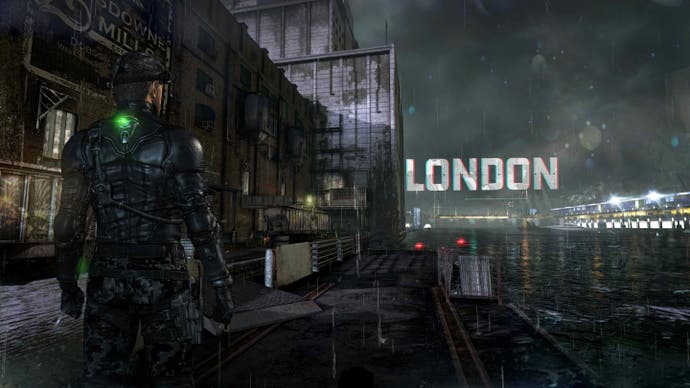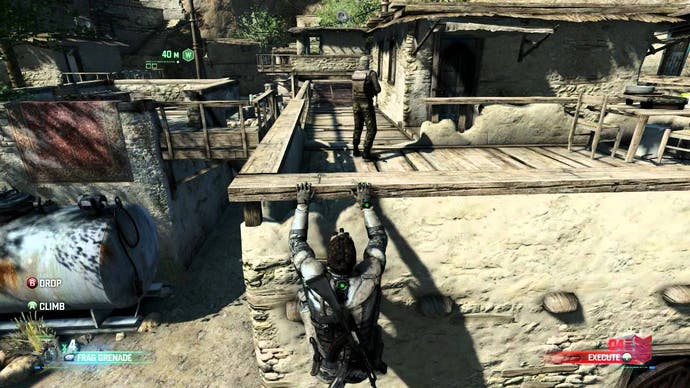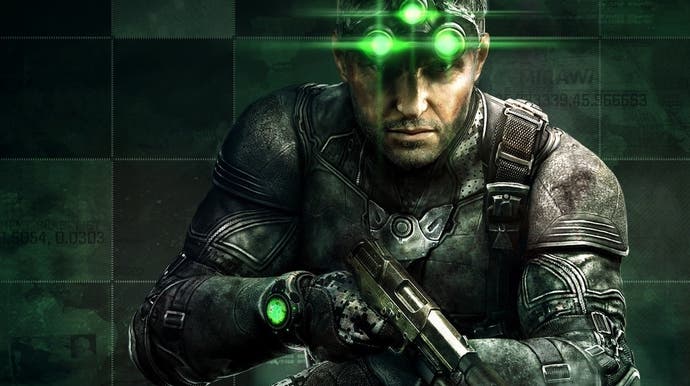Ubisoft, it's really past time to bring back Splinter Cell
I Clancy clearly now.
Three dots. Just three small green dots, formed neatly in a pyramid. Oh how I've longed for the lights to dim during a showcase and see those three dots fade into life on the screen, accompanied by a fizzing whir of improbable tech being powered up. Dear Splinter Cell, where the hell are you?
It's been, in case you need reminding, coming up to six years since Sam Fisher's last outing, the occasionally brilliant Blacklist - itself a course correction of sorts after 2010's Conviction, which was itself a reboot of the reboot that never truly saw the light of day, the original Conviction being retooled significantly along the way. With a recent history as twisted as that, maybe it's no small surprise Splinter Cell's been away for so long.
Still, for all their problems - and there are problems aplenty - I kind of loved the brace of Splinter Cell games Ubisoft gave us during the latter half of the last generation. Conviction's an odd one, but often gloriously so. It started life as a radical reinvention of the series, its extreme deviations from the formula partly coming about because of how its predecessor, Chaos Theory, felt in many ways a perfection of the systems laid out in the 2002 original. And so it presented hobo Sam Fisher, stripped of his gadgets but newly minted with the ability to throw plastic chairs at passers-by.

If you've ever sat through footage of the original Splinter Cell Conviction, you'll doubtless be thankful it never came to pass. Looking more like a brawler than anything else (albeit one with elements of social stealth, which it shared with Assassin's Creed which was being made elsewhere within Ubisoft's Montreal studios at the time), it's hard to imagine the uproar from traditional fans that would have met its release. How Ubisoft retooled that into the Conviction we got to play in 2010 remains one of its finest achievements.
The final Splinter Cell Conviction stayed true to that original concept - of a Sam Fisher stripped of his gadgetry, improvising as he operates outside of the embrace of Third Echelon - while still remaining faithful to the core tenets of the series. Perhaps more importantly, in removing Sam from his stealth suit, it opted instead to put him a ribbed jumper/cargo trousers combo that made him look like he was just popping off to the gardening centre; Metal Gear by way of Millets. I most definitely approved.
And, still, nothing says cold-blooded killer like an in-ear bluetooth headset. Sam's new look - middle management turned murderous - was part of a new approach to stealth. It's more action-based, yes, but it's just as smart as what went before. The mark and execute feature is beautifully empowering, the ability to switch from action to stealth and back again lending Conviction an insistent, infectious rhythm.

It feels great, and the levels that lean on giving that rhythm a good workout are more than enough to make up for those that don't land - the warbound, out-and-out shooter level was, and shall always remain, a drag - and Conviction's pointedly darker, sub-24 tone. If you're playing a Tom Clancy game for the story, though, you should probably have a good look at yourself, and at least the blacker mood gave us the most grisled take on Fisher from Michael Ironside yet. His voice sounds like broken glass being pushed through dry, dusty gravel.
And so the low-point of Conviction's follow-up, 2013's Splinter Cell Blacklist, came as soon as Sam Fisher opened his mouth. Ironside was gone, replaced by the slick, soulless tones of Eric Johnson's read of the character. The official line went along the lines of Ironside stepping aside as he was getting too old for the role - especially given how the role had extended to performance capture as well as a recording of the voice - but so much character was lost as a result.
What was gained? Well, maybe ditching Ironside was the sacrifice needed in order to make way for Blacklist's impeccable sense of movement. There's a beautiful momentum to be found by threading Fisher through Blacklist's levels - levels that are relatively linear, mind you, compared to the sprawl of Splinter Cell when it's been at its absolute peak. Still, it gives Blacklist a focus, and as slim as its levels are they provide ample room for improvisation.
I love Blacklist for how adaptable it is. Scoot down a zipline, pounce on a guard who's unaware, then move back into the shadows in one swift movement. It's even better when plans go awry - and that's where the fun really starts - with Blacklist doing a grand job of segueing its louder action with its quiter stealth moments. Was it perfect? Hardly, though I think Blacklist did a commendable job of toeing the line between traditional Splinter Cell and the kind of out and out gunplay Ubisoft clearly felt modern audiences desired. In its multiplayer, too, it absolutely shone (its take on Spies vs Mercs is exceptional).
So where from here? Who knows, though it's been galling to see the return of Splinter Cell teased repeatedly over the years only for it to come to nothing. It was only last year that Sam Fisher made a cameo in the phenomenally successful, if slightly uninspired Ghost Recon Wildlands - with an even gruffer Michael Ironside restored in the role - which suggested a return wasn't far away. Since then we've had word of a Wildlands sequel - perhaps inevitable given the sales of that game - but still nothing on a new Splinter Cell. Here's hoping it's not left in the shadows for too much longer.


